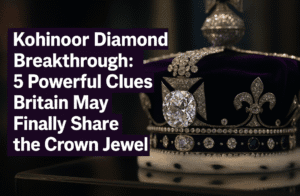Kohinoor Diamond Breakthrough: 5 Powerful Clues Britain May Finally Share the Crown Jewel
British Culture Secretary Lisa Nandy has ignited hopes for a diplomatic breakthrough, revealing ongoing talks about “shared access” to the Kohinoor diamond—a 105.6-carat gem seized by colonial forces in 1849. The discussions, framed around mutual cultural benefits, mark the UK’s first public acknowledgment of collaborative negotiations over contested artifacts. Nandy, Britain’s first Indian-origin Cabinet minister, emphasized her personal ties to Kolkata during meetings with India’s External Affairs Minister S. Jaishankar, signaling a blend of heritage and diplomacy.
While legal barriers like the British Museum Act 1963 complicate full repatriation, proposals for rotating exhibitions or joint guardianship—modeled after UK-India science museum partnerships—offer pragmatic pathways. Indian experts cautiously welcome the shift but stress restitution requires deeper colonial reckoning. Public sentiment in India remains strong, with 82% favoring reclaiming the diamond in a 2022 survey. The dialogue aligns with global restitution trends, positioning the Kohinoor as a litmus test for post-colonial reconciliation.
Should negotiations advance, they could redefine how nations address historical injustices through shared heritage, not just symbolic gestures.

Kohinoor Diamond Breakthrough: 5 Powerful Clues Britain May Finally Share the Crown Jewel
For 176 years, the Kohinoor diamond has symbolized colonial exploitation, its absence from India a lingering wound. Now, a groundbreaking statement by British Culture Secretary Lisa Nandy hints at a potential turning point. During her recent visit to India, Nandy—the first British Cabinet minister of Indian heritage—revealed ongoing discussions about “shared access” to contested artifacts like the Kohinoor, sparking cautious optimism and intense debate.
Why This Matters Beyond the Jewel
The Kohinoor, mined in India and seized by the British East India Company in 1849, is more than a 105.6-carat gem. Its fate represents broader global reckoning with colonial loot. Nandy’s remarks, though carefully framed, mark the first time a UK minister has openly acknowledged collaborative negotiations over such artifacts. Crucially, she emphasized mutual benefit: “People in both countries should have access to cultural artefacts from a very different era.”
The Road to Reconciliation
Nandy highlighted the UK-India Science Museums Group partnership as a blueprint, where artifacts rotate through joint exhibitions. This model, she suggested, could extend to other sectors like film, gaming, and fashion. Notably, her visit included meetings with External Affairs Minister S. Jaishankar, signaling high-level diplomatic engagement.
Personal Ties and Political Realities
Nandy’s personal connection adds nuance. “My father grew up in Kolkata… I’m deeply proud to be the first Labour Cabinet minister of Indian heritage,” she shared, balancing cultural diplomacy with political pragmatism. However, legal hurdles remain. The UK has long cited the British Museum Act 1963, which prohibits disposing of artifacts, though loans and shared custody could bypass this.
Voices from India: Hope and Skepticism
While Indian officials haven’t yet commented, heritage experts like Dr. Kavita Singh, Dean of JNU’s School of Arts, caution: “Shared access is progress, but true restitution requires acknowledging past wrongs.” Public sentiment leans stronger—a 2022 survey found 82% of Indians support reclaiming the Kohinoor.
A Broader Diplomatic Canvas
Nandy’s visit wasn’t solely about cultural artifacts. She condemned the recent Pahalgam terror attack, reaffirming UK-India counterterrorism ties. This dual focus underscores how cultural and security collaborations are increasingly intertwined in modern diplomacy.
The Path Ahead
The Kohinoor talks coincide with global movements like France’s repatriation of Benin bronzes and Germany’s Namibia genocide apology. For the UK, a nation grappling with its colonial legacy, partnering with India—a rising power increasingly assertive about its history—could redefine post-colonial relationships.
You must be logged in to post a comment.